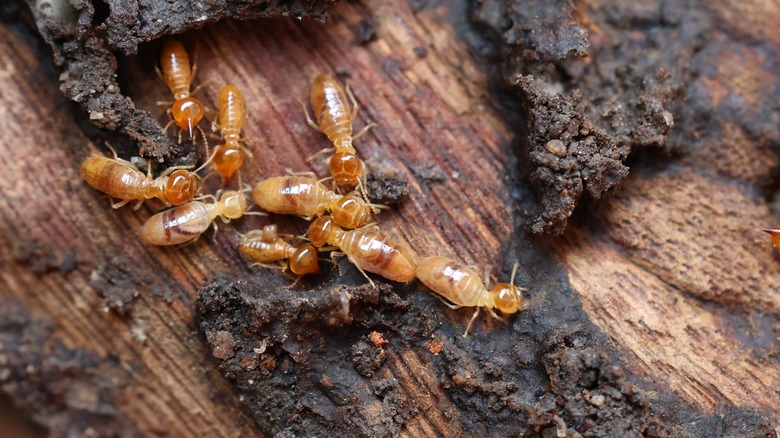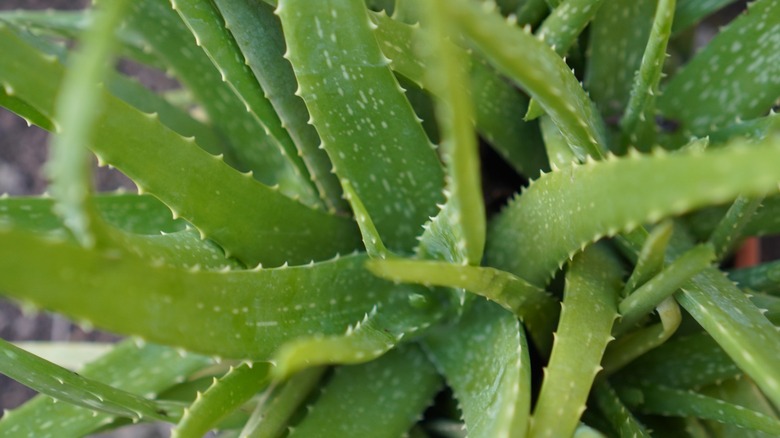Can Aloe Vera Really Keep Termites Out Of Your Home?
When it comes to protecting your home, sometimes the smallest measures can make the biggest difference. Termites are like the freeloaders of the pest world, as they can devour your home from the inside out — so it's important to protect your space from them. While there are ways to get rid of termites once they enter, these methods can be costly and time-consuming, so it's best to prevent them from ever entering in the first place. There are many practical measures you can take to keep termites from infesting your home, like sealing gaps, reducing moisture, and keeping an eye out for any possible activity. However, you may have also heard about another simple ingredient that can be used to prevent them — aloe vera. Perhaps you're wondering if this ingredient works. Well, while many pest control companies recommend covering furniture with aloe vera to kill or prevent the insects, there isn't any conclusive, reliable data that shows that aloe vera can effectively keep termites away from your home.
Still, this may be a worthwhile trick to try if you want to use natural pest control remedies. Furthermore, harvesting your own aloe vera is easier than you'd think, making it a convenient option for home protection. Learn more about why this trick is believed to work and how to use this natural product to possibly keep termites out of your house.
How effective could aloe vera be against termites?
You've likely used aloe vera after a day at the beach to soothe a sunburn, but this wonderful plant could also be used to protect your wooden furniture from termites. Many pest control companies list aloe vera as a natural way to kill or prevent termites from damaging wooden items. By spreading the gel on any infected furniture, you may effectively suffocate the insects within. Even if your furniture isn't infested yet, the aloe vera could act as a barrier that keeps the insects from damaging your wood.
Furthermore, in a 2021 study published by the BioScientific Review, a dried aloe vera plant was ground up into a powder and then 55 Heterotermes indicola termites were exposed to it. When exposed to 10% concentration of the dried aloe vera for 24 to 96 hours, 94% of the termites died. This demonstrates that the powder of this plant could be an effective way to treat termites. Finally, the American Chemical Society has tested aloe vera peels and found that they have some insecticidal properties in general. This could point to an increase in aloe vera being used to prevent insects in homes in the future. However, keep in mind that a 2022 systematic review published by Insects names aloe vera as an untested remedy that may not be able to effectively control subterranean termites.
Ways to use aloe vera against termites
Much like how you can use petroleum jelly as a household essential that will drive termites away, you could also use aloe vera to potentially get rid of termites. Since termites love to hang out in wood, whether it's your furniture or the structure of your home, applying aloe vera gel directly to those areas can be a simple but effective step. You can do this whether or not the wood is already infested to either kill or protect against the insects. However, when you do this, ensure you use pure aloe vera and not the type that's sold in a bottle for the skin, as it could contain additional chemicals or scents that may actually attract termites.
You could also try dehydrating an aloe vera plant, grinding it up, and sprinkling it in areas where you've seen termites or the aftermath of their damage. Or, you could just purchase the pure powder instead of making it yourself. This could possibly deter termites from entering those spaces, but keep in mind that the insects would likely need to be exposed to the powder for a long amount of time for it to effectively kill them.
Before you try these methods though, know that aloe vera is toxic to pets. Additionally, as discussed, this may not be the most effective treatment against termites. If you find that these ideas aren't working for you, be sure to call a pest control professional for help.


